How Amazon’s gone to the dogs and why its staff have never been happier
Amazon’s ‘dog-obsessed culture’ is rolling out to its Australian offices with the tech behemoth arguing if it lifts productivity and helps staff retention, why don’t other big corporates try it?
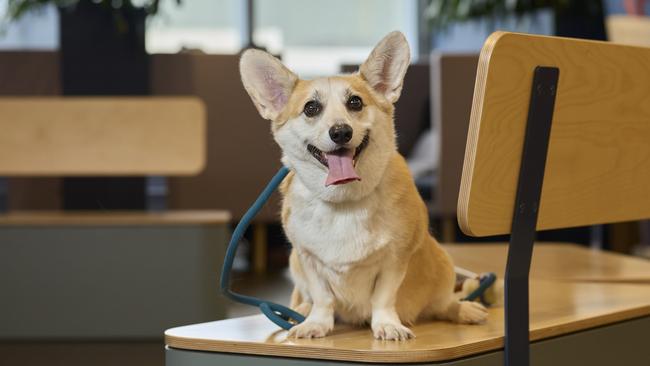
Walk into Amazon’s global headquarters and the first thing you notice are the dogs.
Corgis, poodles, dachshunds and miscellaneous pooches prance and sniff around a purpose built dog park before their owners take them high into one of the 40 office buildings that make up the tech behemoth’s campus in downtown Seattle.
Amazon admits it has a “dog obsessed culture”, with more than 10,000 of them registered to come to work with their owners at its head office. That’s a ratio of about one dog to every five employees.
The sight appears contrary to Amazon founder Jeff Bezos’s reputation as a brutally competitive businessman, who once reportedly told staff to “approach…small publishers the way a cheetah would pursue a sickly gazelle”.
Amazon also offers employees discounted pet insurance and free treats for registered dogs, clashing even more with Mr Bezos’s known craving for a saving.
This is a billionaire - once the world’s richest man - who insists on frugality, flying employees in economy rather than business class and uses desks for doors because they are cheaper.
But when it comes to dogs, Mr Bezos may have unlocked the key to lifting productivity while also solving a problem that many Australian bosses are grappling with - how to cure the pandemic hangover of working from home.

It’s a tough task. Commonwealth Bank chief executive Matt Comyn sparked an employee revolt in May when he told his 49,000 staff that they were expected to physically work from the office at least 50 per cent of time.
Mr Comyn’s rival at NAB Ross McEwan also ruffled some of his senior leaders earlier this year when he told them they must work from the office five-days-a-week, having previously declared that remote working was sapping the life out of CBDs and harming small businesses.
Crown Resorts boss Ciaran Carruthers also said working from home is driving away tourists from Australia’s capital cities, given the lack of vibrancy the exodus of workers has caused.
Mr Bezos was not immune from the pandemic-enforced work from home mandates, with the spread of Covid-19 emptying his towering collection of office buildings in downtown Seattle.
But instead of complaining about it, the company that Mr Bezos founded in his garage in 1994 raised $US19m ($30.1m) in four days to support nearby cafes and other businesses, to ensure they’d still be open when employees returned to the office.
At the same time, he doubled down on the Amazon’s Dogs at Work or ‘pupazonian’ program, which is now spreading from Seattle to Sydney and Melbourne and the company’s other locations around the world.
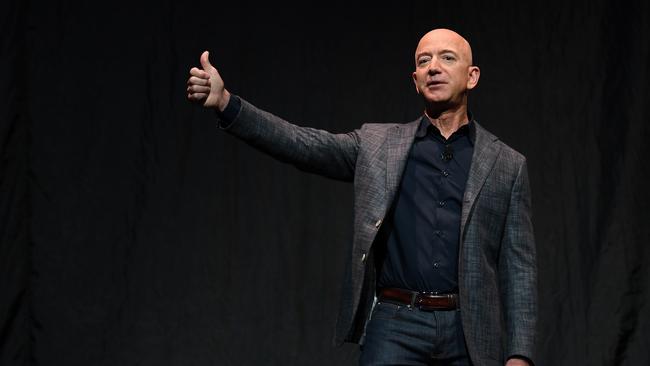
The result: the place is now flourishing with workers returning to the sprawling complex. Turns out, creating an office space where people want to work - and feel they can be their most productive - is a key way to stem the tide of remote working.
An employee might not have to follow Amazon’s lead and turn their office into pseudo petting zoos - they might make the workplace appealing in other ways, such as adding a few more pot plants.
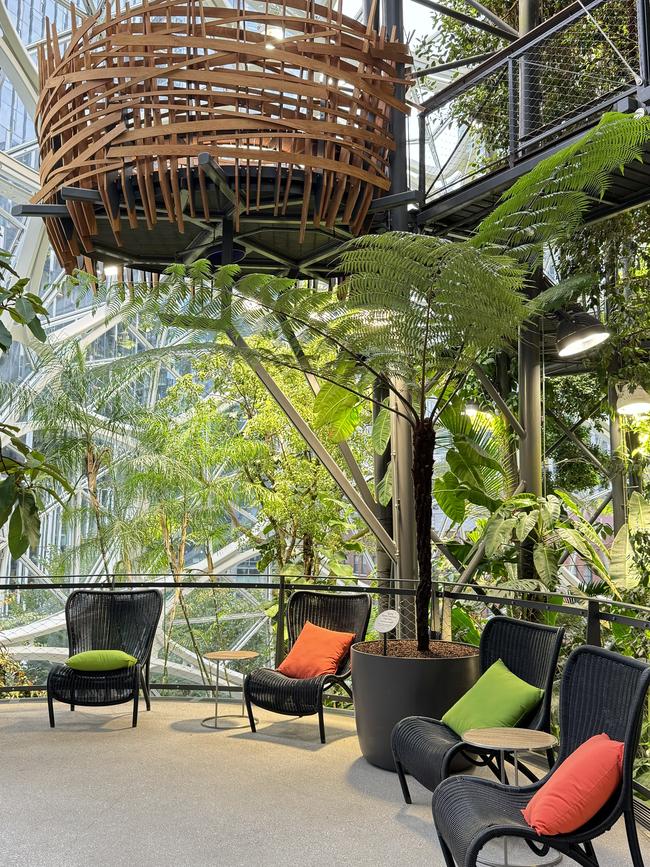
This is something that Mr Bezos has also taken to the extreme, spending hundreds of millions of dollars building ‘The Spheres’ - a multi-domed enclosure at its Seattle headquarters made from about 2600 panes of glass and housing 40,000 plants, including a 15m high fig tree. Why? Because he believes employees are more creative and productive when exposed to nature.
If Amazon workers can’t make it to the actual Amazon, then a slice of the famed jungle will come to its office.
But it is the company’s dog policy that has had particular resonance in Australia where employees have registered 110 dogs - and counting - to bring to work. So how does this make workers more productive?
According to Amazon it allows them to attract the best talent in a fiercely competitive industry, with 64 per cent of all Australian workers saying a dog-friendly workplace would make a job more attractive to them, based on an independent survey commissioned by the company.
This has become more vital to workers after dog ownership exploded during the pandemic, with pet ownership soaring from 61 to 69 per cent, sparking a new gold rush, with companies from Woolworths and Blackmores to global food giants Mars and Nestle moving to cash in on a market, estimated to be worth $10bn and growing.
But when work from home mandates ended, employee anxiety began to grow. The Amazon study found 57 per cent of workers who own a dog said that they feel anxious when they leave their pet at home alone. Meanwhile, 57 per cent said their dog would struggle to adjust when they start going back into the office.
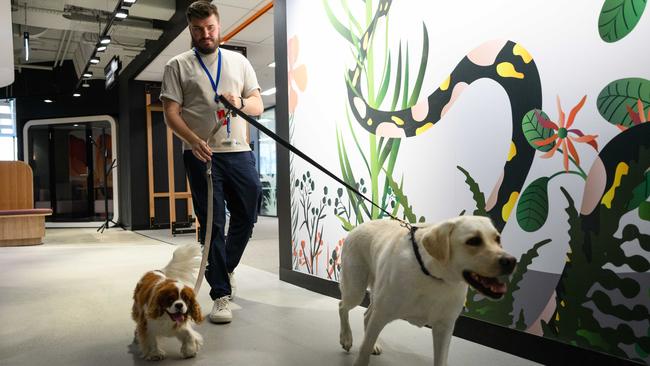
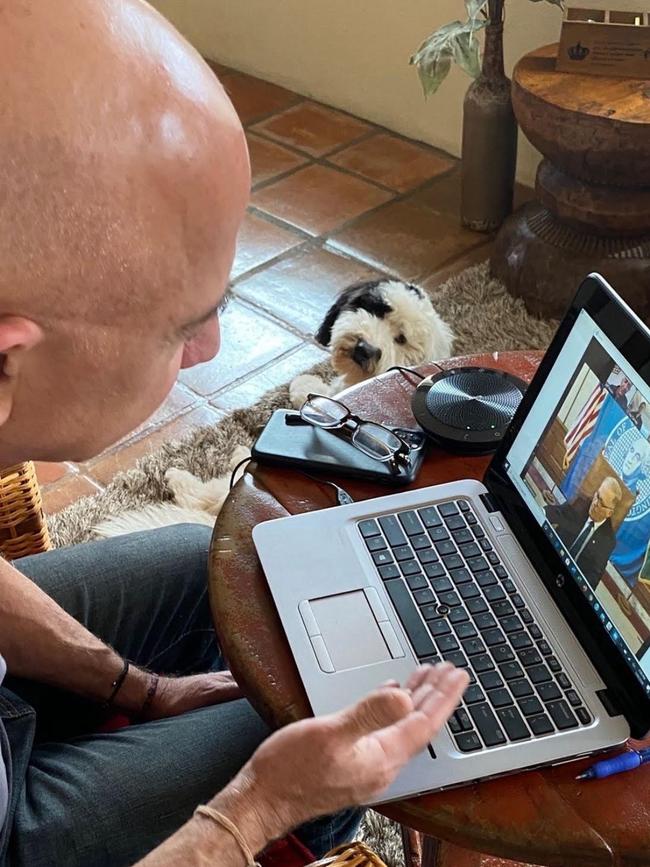
Georgia Mitchell - senior manager for workplace experience at Amazon Asia Pacific - who is based in Melbourne said the policy influenced her decision to become the owner of Jerry, a border collie, last May.
“Knowing that I could bring him into the office is obviously a big decision factor when I was weighing up whether to get a dog or not,” Ms Mitchell told The Weekend Australian.
“A lot of Australians got dogs during the pandemic and it was quite timely that we were able to work with our landlords and localise the Seattle dog policy for our Australian buildings.”
Laura Nemaz, a senior human resources business partner, says bringing dogs to the office also fosters greater teamwork.
“Dogs add to our dynamic and collaborative workplace and we’ve found they are an unexpected mechanism for connection. It’s great to walk through the office, give the dogs a pat and have a chat with people I might not otherwise speak to regularly,” Ms Nemaz says.
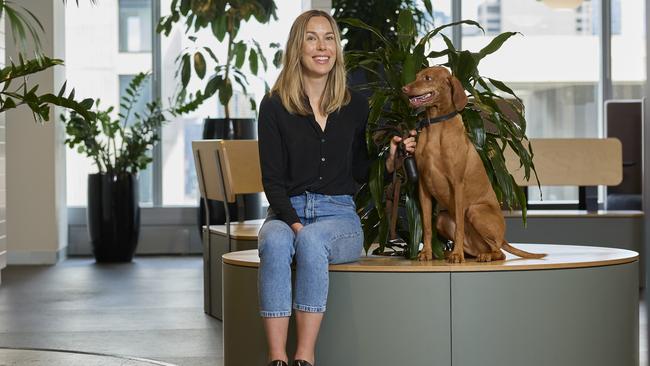
Its a philosophy that food giant Mars also subscribes to, having introduced a dog friendly office policy across its petcare division 10 years ago. “Interacting with pets has been shown to improve productivity, reduce workplace stress, keep us active and increase social interaction,” Mars Petcare says.
“Benefits extend to our four-legged friends, too. Allowing pets to spend the day with their owners, rather than alone, helps give them a more fulfilling life.”
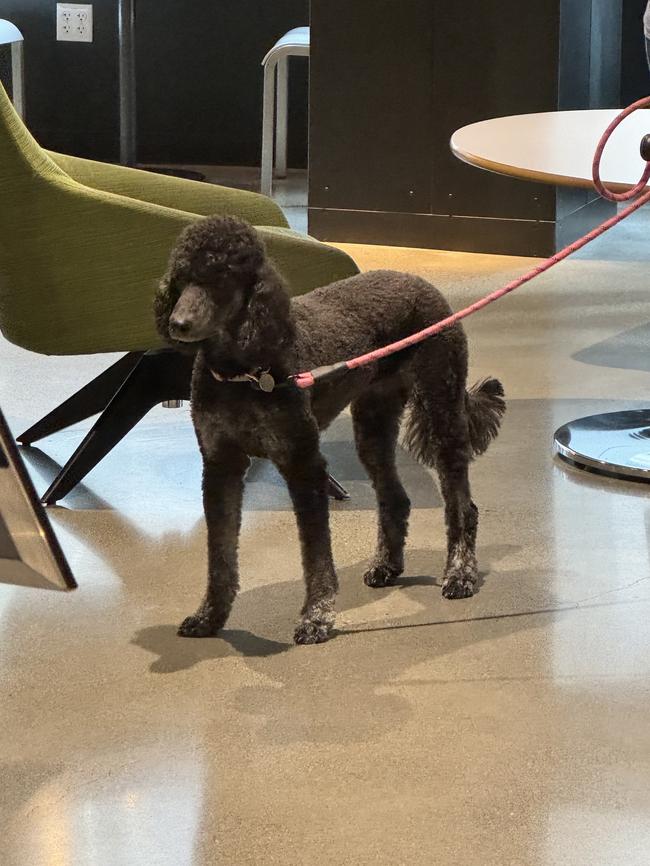
But not all offices are equipped like Amazon’s or Mars Petcare’s with rooftop dog gardens and relief stations to avoid accidents on the carpet. Further, most Australian companies - particularly airlines - have shown they aren’t that dog friendly.
Despite the Civil Aviation Authority relaxing its rules on pets in plane cabins two years ago, Qantas and Virgin continue to ban dogs and cats on board, except service animals. The resistance to pet-friendly flights is at odds with overseas airlines, many of which allow dogs, cats and other smaller animals on board provided they are in a secure container or carry case.
Critics might say allowing pets into the office creates a Hotel California-type atmosphere - which has the tech industry has gained some notoriety - whereby the office perks are so good that employees don’t want to leave the building.
But Mr Bezos doesn’t want workers behind their desks - or doors - all day. Amazon’s staff “restaurants” at its Seattle HQ are designed to cater for only 30 per cent of employees, forcing them to venture outside.
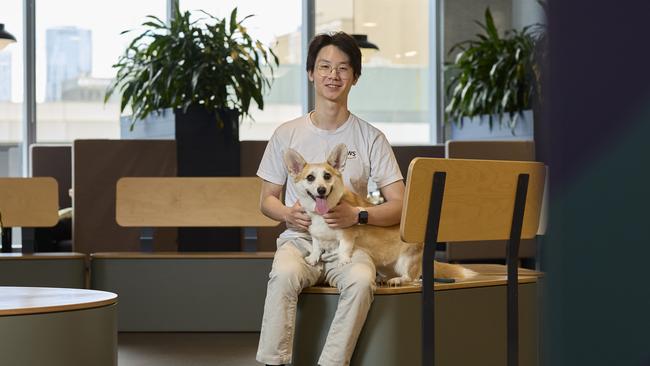
“We want our employees to go out into the community and grab coffee or food from local retailers. This is one of the many ways we help create economic vibrancy in our neighbourhood and support local businesses,” an Amazon employee says on a tour of the complex.
And Georgia Mitchell says being allowed to bring Jerry the border collie to work in Melbourne has also made her take regular breaks outside.
“Sometimes I could find myself just like sitting at my desk all day without really, you know, I‘ve got an Apple Watch that reminds me to go for a walk or stand,” Ms Mitchell says.
“But when I’ve got Jerry here, I have to go (outside) because he needs a break. So having those mindfulness breaks, I think for me makes me feel like I’m getting more benefit from just stepping outside. Even if it’s five minutes, it makes a big difference.”
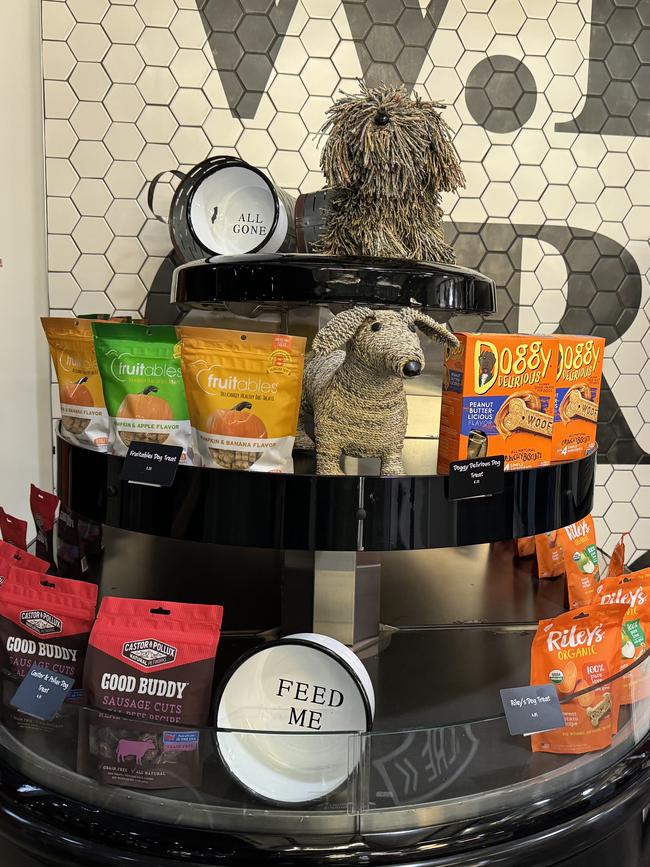
The stress busting power of dogs is also backed by researchers at Virginia Commonwealth University, with psychiatry professor Sandra Barker, saying “bringing therapy dogs onto campus is a low-cost intervention that doesn’t have any side effects”.
Indeed, it has done Mr Bezos no harm, with his dog friendly policy dating back to the mid-1990s soon after he founded Amazon.
Eric Benson, one of the company’s first software engineers asked if he could bring his dog Rufus, a corgi, to work. Mr Bezos responded, asking “is he a good dog?”.

Rufus was more than that. He became akin to Mr Bezos’s lucky charm, and was a feature at the company’s early website launches where his owners hovered his paw over a keyboard and dropped it to flip the site. By 1998, Amazon allowed all dogs as part of its lease at Beacon Hill’s Pac Med building in Seattle, and silhouettes of corgis are featured on signs across the company’s current headquarters, indicating where dogs are allowed and not allowed to go.
A building is even named after Rufus to reflect his role in Amazon’s early success. The company has become the world’s fifth most valuable, with a market capitalisation of $US1.34 trillion, while Mr Bezos is estimated to be worth $US154.6 billion, proving that there is no harm letting a business go to the dogs.
The author travelled to Seattle as a guest of Amazon.


To join the conversation, please log in. Don't have an account? Register
Join the conversation, you are commenting as Logout